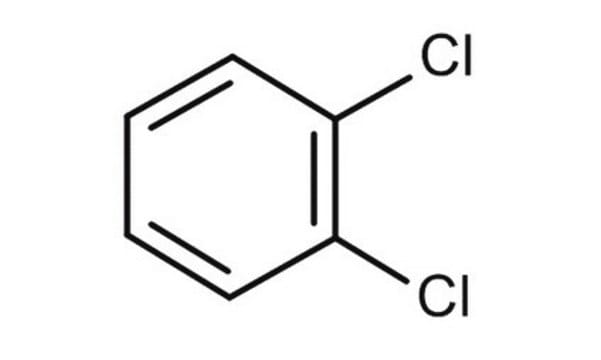240664
1,2-Dichlorobenzene
anhydrous, 99%
Synonym(s):
o-DCB, o-dichlorobenzene
About This Item
1.6 mmHg ( 35 °C)
Recommended Products
grade
anhydrous
Quality Level
vapor density
5.1 (vs air)
vapor pressure
1.2 mmHg ( 20 °C)
1.6 mmHg ( 35 °C)
Assay
99%
form
liquid
autoignition temp.
1198 °F
expl. lim.
9.2 %
impurities
<0.003% water
<0.005% water (100 mL pkg)
evapn. residue
<0.0003%
refractive index
n20/D 1.551 (lit.)
bp
178-180 °C (lit.)
mp
−18-−17 °C (lit.)
density
1.306 g/mL at 25 °C (lit.)
SMILES string
Clc1ccccc1Cl
InChI
1S/C6H4Cl2/c7-5-3-1-2-4-6(5)8/h1-4H
InChI key
RFFLAFLAYFXFSW-UHFFFAOYSA-N
Looking for similar products? Visit Product Comparison Guide
Application
related product
Signal Word
Warning
Hazard Statements
Precautionary Statements
Hazard Classifications
Acute Tox. 4 Inhalation - Acute Tox. 4 Oral - Aquatic Acute 1 - Aquatic Chronic 1 - Eye Irrit. 2 - Skin Irrit. 2 - Skin Sens. 1B - STOT SE 3
Target Organs
Respiratory system
Storage Class Code
6.1C - Combustible acute toxic Cat.3 / toxic compounds or compounds which causing chronic effects
WGK
WGK 2
Flash Point(F)
150.8 °F - closed cup
Flash Point(C)
66.0 °C - closed cup
Personal Protective Equipment
Choose from one of the most recent versions:
Already Own This Product?
Find documentation for the products that you have recently purchased in the Document Library.
Customers Also Viewed
Articles
Single molecule electronics is the endeavour of constructing electronic circuitry with single molecules as the fundamental building block.
Single molecule electronics is the endeavour of constructing electronic circuitry with single molecules as the fundamental building block.
Single molecule electronics is the endeavour of constructing electronic circuitry with single molecules as the fundamental building block.
Single molecule electronics is the endeavour of constructing electronic circuitry with single molecules as the fundamental building block.
Our team of scientists has experience in all areas of research including Life Science, Material Science, Chemical Synthesis, Chromatography, Analytical and many others.
Contact Technical Service












